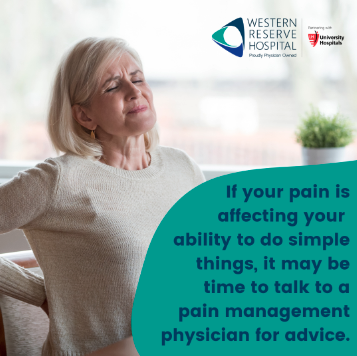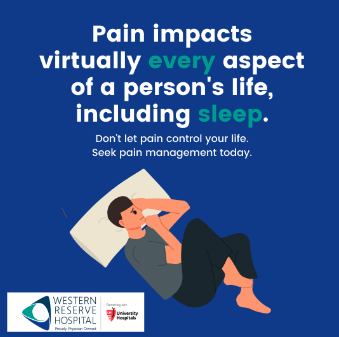Pain can really affect everything in your life. It makes it hard to do daily activities, be happy, and even sleep well. But there's a way to make things better – it's called pain management. Pain management helps improve your life when you're facing these challenges.
Pain isn't just a feeling; it can make you upset and stressed. Pain management tries to diminish the hurt, which helps you feel better overall.
Pain's Impact on the Quality of Life
Continuous pain impacts every aspect of a person's life. This includes the pain itself, the emotional distress it causes, and how it affects relationships – often causing problems in them, disruption of sleep, and a decrease in physical abilities. People are limited in what they can do, and their mobility is also affected, which can lead to other health problems. These limitations greatly reduce the overall quality of life.
Who Should Seek Pain Management?
Usually, most types of pain we feel can be managed without needing extra help. Occasional aches tend to appear and disappear, and there are medicines that can be bought without a prescription if the pain becomes too much to handle on your own. However, if the pain keeps coming back and starts to really impact someone's quality of life, their ability to do things, or their plans, that's when it might be a good idea to explore other methods and perhaps talk to a pain management physician for advice.

Pain management extends an invitation for individuals to assume an active role in their well-being. It furnishes them with the tools and insights required to make informed decisions about treatment avenues and lifestyle recalibrations, restoring a sense of mastery over pain.
How Do Pain Medicines Work?
In a broader sense, there are various kinds of pain medicines. You don't have to turn to pain medicines immediately; in fact, there are non-opioid options to try first. However, when the pain reaches a certain level, using pain medicines might become an option. These medications come in different types. One type is anti-inflammatory, commonly found over the counter. They work by reducing inflammation, which in turn helps to alleviate pain.
Another kind of medicine falls under the category of membrane stabilizers. These medicines work by slowing down the pain signals in the spinal cord and brain, providing a sense of relief to the person.
There are also other types of medicines, including opioids. These are not the primary choice for treatment, but for certain patients, they might be necessary. It's important to note that opioids come with significant side effects, which should be discussed thoroughly with a doctor. These common side effects include respiratory depression; in some cases, it can even be fatal. Therefore, caution is crucial when considering these types of medicines. They are available, but their usage should be carefully weighed at the lowest effective dose based on the patient's needs and potential risks; opioids for pain are not meant for long-term use. If used long-term, the risk of addiction may develop.
Risk of Pain Management and Pain Medicine
The primary approach for treating most musculoskeletal pain conditions involves working with a physical therapist and rehabilitation through exercises. This method carries minimal risks. However, there are certain inherent risks associated with specific types of medicines. Medications can have side effects that need to be monitored and anticipated.
Furthermore, there are some risks related to injections, but they are quite low. For instance, in the United States alone, around 10 to 11 million epidural procedures are conducted annually, and the rate of complications is extremely low. Overall, this treatment is considered very safe. Still, it's important to understand the possible side and adverse effects or potential complications that could arise.
Quality of Life With Pain Management
Pain impacts virtually every aspect of a person's life. It diminishes their physical abilities, limits their mobility, interferes with relationships, and even disrupts sleep. Poor sleep can ruin an entire day. Pain ripples through numerous facets of life. However, these effects can be tackled through effective pain management.

This management encompasses a variety of approaches, such as physical rehabilitation, chiropractic care, massage therapy, specific medications, interventional procedures, and pain psychology. These methods have proven to be beneficial for many patients, addressing the diverse challenges that pain presents.
When Should I See a Doctor About My Pain?
Typically, when you experience minor aches, you don't need to rush to the doctor right away. Often, lifestyle adjustments and over-the-counter medicines can help manage such discomfort. However, if the pain persists and begins to significantly impact your quality of life or hinder your ability to do things you want to do, that's when it's a good time to seek advice from a pain management specialist to receive prescription pain medication potentially.
Additionally, if you're dealing with sudden and severe pain, like an unusual and intense headache, or if you notice uncommon signs or symptoms – for instance, sudden numbness or weakness in both legs or issues with controlling urine or bowel movements – these are rare situations where immediate attention or assistance should be sought.
The Cultivator of Contentment
Chronic pain has a tendency to erode self-sufficiency, elevating dependency on others. The tapestry of pain management ensures that individuals retain their autonomy, steering the course of their daily lives with personal agency intact.
Pain management emerges as a cultivator of contentment, weaving a tapestry of enhanced life satisfaction. By mitigating pain's influence, individuals can relish greater happiness and a sense of fulfillment, redefining their perspective on overall well-being.
Key Takeaways
- Impact of Continuous Pain on Quality of Life: Continuous pain affects every aspect of a person's life, including emotional distress, relationships, sleep disruption, and reduced physical abilities. Mobility limitations can lead to other health issues, significantly lowering the overall quality of life.
- The Metaphor of Persistent Pain: One individual likened persistent pain to being a tortured prisoner 24/7. Despite its importance, a stigma around openly discussing pain leads to continued suffering.
- Determining the Need for Pain Management: Most minor pains can be managed with lifestyle changes and over-the-counter medications. However, if pain persists and hampers the quality of life or daily activities, consulting a pain management specialist is advised.
- Mechanisms of Pain Medicines: Pain medicines come in various types, such as anti-inflammatories, membrane stabilizers, and opioids. Anti-inflammatories reduce inflammation to alleviate pain, while membrane stabilizers slow pain messages. Opioids, though not first-line, may be necessary for some patients, but their side effects must be carefully considered.
- Risks of Pain Management and Medicines: Physical rehabilitation carries minimal risks, but certain medications have potential side effects. Injection risks are low, and treatment is generally safe. Understanding potential complications is vital.
- Significance of Pain Management for Quality of Life: Pain affects physical abilities, mobility, relationships, and sleep. Effective pain management methods include physical therapy, chiropractic care, massage, medications, interventions, and pain psychology.
- When to Seek Medical Attention for Pain: Minor aches can be managed with lifestyle changes and over-the-counter medicines. However, if pain significantly affects the quality of life or causes unusual symptoms, consulting a pain management specialist about a treatment plan is recommended. Immediate attention is necessary for severe or unusual pain and symptoms.
Pain Medicine at Western Reserve Hospital — 100% Patient Centered Pain Treatment
You don’t have to suffer from persistent pain. At the Center for Pain Medicine at Western Reserve Hospital, we provide the latest innovations in pain treatment. When chronic pain sets in, your life shrinks to fit your pain. Your health, work, and relationships suffer. You become less present in your daily activities. Often, you cannot sleep or suffer from depression. Living with chronic pain is hard, and the anxiety, stress, and anger that accompany it can make the pain even worse. The pain specialists at the Center for Pain Medicine at Western Reserve Hospital can help you conquer your pain with sophisticated new treatments and compassionate, professional care. Contact us at (330) 971-7246 to schedule an appointment and begin the journey to pain relief today.
